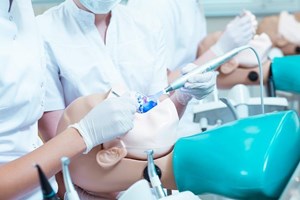7 things to know before you start dental nursing
Published: 05/04/2021
Georgia Rytina shares her insight of the world of dentistry for those yet to discover the dental environment experience
When training to be a dental nurse, you are invited to enter into a world of specialist knowledge. You expect to learn about anatomy, safeguarding and infection control, but some of the most valuable revelations I had while training were the kind you cannot learn from a textbook.
First month
The volume of information alone caused a month-long headache. Starting as a trainee dental nurse was overwhelming – in a good way – and the first milestones I acknowledged were being trusted with the aspirator and being trusted with the phones.
1. Tongues are strong. It’s difficult to appreciate exactly how powerful and explorative the tongue can be, until you are wrestling with more than 30 of them each day. I spent three weeks desperate to be involved and then, when passed the baton, immediately felt out of my depth. Ironic because, if there is an easy way to judge your depth perception, it’s by holding a tube in somebody else’s mouth.
2. Forget your definition of emergency. Pain, swelling, uncontrollable bleeding or trauma are your emergency basics. Unfortunately, this does not include cosmetic corrections – however important it may feel to have a gap filled the day before a job interview! Receptionists are first line of defence in any NHS establishment, so make sure you are familiar with the guidelines and priorities of the front desk.
Second month
You acquire a new skill and then you do it again and again and again. Routine is huge part of dental nursing and coming to terms with that was a big step. Repetition can be tiring, but it is also a fantastic tool for learning.
3. Teeth will take over your life. Oral hygiene paranoia will reach an all-time high. Your friends and family will ask you to look at their teeth. Even the monsters in Doctor Who will have faces covered in teeth. I had nightmares about teeth in the early stages of training and I attribute this to the repetitive nature of the job!
Third month
For me, the best way to combat repetition was to ask questions. Why? Because the professionals around me loved to answer them. The more answers I got, the more confident I grew, the more questions I asked, and the stronger my relationship with my colleagues became.
4. A good working relationship benefits the patients, too. A mutual respect between colleagues is easy to spot in a dental environment – and it seems to have a calming effect on patients. Patients appeared less embarrassed to ask what a root canal is when I’d already asked what a ball burnisher might look like. I found that, if I was responsive and receptive when working, it encouraged patients to ask questions and better engage with their treatment as well.
5. Listen. The people around you have studied for years to get to this point in their careers. I knew all about periodontal disease weeks before it came up in my studies simply because our hygienists were so happy to share their knowledge with me. Showing an interest not only helped me, but it reassured the rest of the team of their vast and valuable experience.
Fourth month
By this point, I was well integrated in terms of practice. I could set up the decontamination room, adapt to different dentists and manage patients with ease. Only then, did the lessons of self begin.
6. Attitude is everything. Social interaction is an obvious requirement for many jobs but I hadn’t anticipated how comprehensively my social skills would be tested as a dental nurse. From patients who are hard of hearing to co-workers running 30 minutes over, there are complications in surgery that require appropriate care and attention to keep appointments running as smoothly as possible. Remember, a dental practice can be a challenging environment for many – not least the staff – so it helps to keep a forgiving and composed attitude.
7. A big smile goes a long way. It seems silly to point out that smiling is important when working in a dental practice but it truly does more than advertise good practice. It gives a friendly first impression to nervous patients, it boosts team morale and it helps to keep you going. I have a deep respect for anybody in the dental profession, whether they are manning a phone or an autoclave, and working around these hardy, educated and caring people taught me more than I could imagine about work ethic – as well as about myself.
Author: Georgia Rytina








.jpg?width=150&height=100&scale=canvas)




